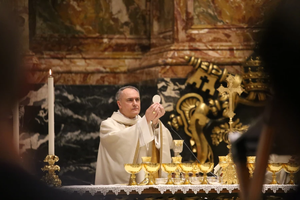Beyond the Games: How Sports Can Help Kindle the Flame of Holiness
Faith in Christ reveals that all things, including sports, are meant to be united to Christ and find their fulfillment only in him.

When is a Catholic school’s sports program really successful?
It is perhaps an understatement to state that sports play a large role in modern culture. According to Statista.com, in 2022, sports industry revenue across the globe totaled $403.8 billion. Youth sports alone accounted for $37.5 billion. From recreational organizations to professional leagues, the love for sports holds a central place in the modern world.
It is no surprise, then, that this same love for sports has deeply influenced Catholic schools. Catholic schools often tote “success” in sports as a point of pride to drive admissions. They frequently point to state championships and Division I athletes as signs of this success. But is this really how we ought to measure the eminence of a Catholic school’s sports program? Or is there more to a sports program than so frequently meets the eye?
In his letter to the Romans, St. Paul encouraged the early Christians to “not be conformed to this world but be transformed by the renewal of your mind” (Romans 12:2). As disciples of Jesus Christ, we see things differently. Our faith gives us a new perspective, one open to eternity, so that we see the deeper purpose of things. Again, St. Paul highlights this important aspect of faith when he says, “For he has made known to us in all wisdom and insight the mystery of his will, according to his purpose which he set forth in Christ as a plan for the fullness of time, to unite all things in him, things in heaven and on earth” (Ephesians 1:9).
Faith in Christ thus reveals that all things, including sports, are meant to be united to Christ and find their fulfillment only in him. Indeed, in recent centuries, the Church has made this exact point. Sportsmen such as Blessed Pier Giorgio Frassati and Pope St. John Paul II have emphasized that the end of sports is ultimately the glorification of God through the development of the human person. In a beautiful passage from Pope Pius XII that should guide all Catholic school sports programs, the Holy Father says:
Sport, rightly understood, is an occupation of the whole man, and while perfecting the body as an instrument of the mind, it also makes the mind itself a more refined instrument for the search and communication of truth and helps man to achieve that end to which all others must be subservient, the service and praise of his Creator.
Sport is meant to train the human being physically, morally and even intellectually so that he can properly worship God. In other words, a sports program will be truly successful only if it is fulfilling its ultimate goal and leading students to sanctity.
This notion of sport is so different from our common observation of the worldly glory of victory that it is worth considering how a properly ordered sports program, one with God as its ultimate goal, would look different from a sports program that embodies the spirit of the age. In a truly successful sports program, students on various teams will encounter Christ in a deeper, more radical way, precisely through their participation in sports. In such a context, the faith is far more than simply a prayer before and after games, rather, it is an incarnate reality in the very culture and experience of the team.
Because you cannot give what you don’t have, in such a sports program the coaches and trainers would themselves first be faithful disciples of Jesus Christ, introducing their student-athletes to the Lord whom the coaches already personally know. Similarly, a priority will be placed on hiring coaches who are already in love with Christ, and their ability to form new disciples will be more highly valued than their ability to win games. In this truly Catholic sports program, the coaches would frequently discuss and evaluate how their teams are leading young people to Jesus in a way similar to how they evaluate game film and strategy. The ultimate opponent to defeat would thus be the sinfulness found in the human heart, not necessarily the team on the other side of the field.
Furthermore, such a sports program would have concrete effects on the culture of the broader school. Students in a devout sports program such as this one would be motivated by their faith to become more involved in the religious culture of the Catholic school. Daily Mass, retreats, discernment groups — students of a truly successful sports program would be drawn to these activities as they sought to live out their deepening faith in a more fully integrated way. The arts and beauty would similarly become attractive to them such that they would seek out music, drama, painting, drawing and more. Rather than being solely focused on their sport to the detriment of other activities, a successful sports program ought to lead its students into a deeper immersion in the many aspects of Catholic culture that can build up faith.
On the reverse, a Catholic school with an “unsuccessful” sports program would look exactly the opposite of what we have described. Instead of leading students to the recognition of the Creator, an unsuccessful sports program would focus on temporal glory in such a way that it builds up pride in the soul. Similarly, its coaches and staff would be more focused on victories and give very little thought to holiness. Such misplaced priorities can lead to degrading and humiliating styles of coaching that do not account for the dignity of the person. Finally, oftentimes in such a program a “sports culture” develops where students begin to identify themselves more by the sports they play than by the broader Catholic community. They may withdraw from other activities to focus solely on winning and no longer recognize the value of the truth, goodness and beauty they are receiving in the full life of the school.
In conclusion, then, the success of a Catholic school’s sports program cannot be measured by its earthly victories. St. Paul points out the superiority of holiness over temporal glory precisely in the context of sports when he speaks of worldly athletes saying, “Every athlete exercises self-control in all things. They do it to receive a perishable wreath, but we an imperishable” (1 Corinthians 9:25).
For those of us involved in education, we must strive to implement these principles in our own sports programs. Parents of young people today similarly ought to instill these desires for greater holiness in their own children, but they should also speak out when they see Catholic sports programs failing. Finally, all of us should work to support schools where such an integrated vision of the human person is being lived out. Doing so would go a long way towards evangelizing the sports culture around us that is so deeply longing for Christ.
















